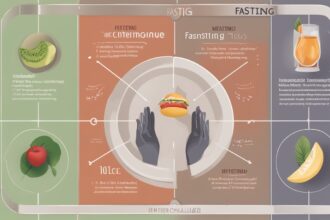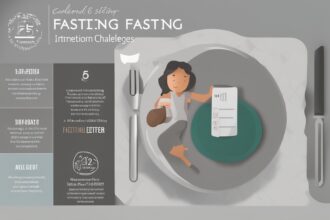Fasting, whether for spiritual, health, or personal reasons, is a powerful practice that can transform your mind and body. However, it often comes with significant challenges that test your willpower and determination. Overcoming tough fasting hurdles is not just about enduring hunger—it’s about mastering your mindset, preparing effectively, and finding strategies to push through the most difficult moments. In this comprehensive guide, we’ll explore actionable tips and insights to help you conquer the obstacles that stand in the way of a successful fast.
Understanding the Common Challenges of Fasting
Fasting can be incredibly rewarding, but it’s not without its difficulties. Many people struggle with hunger pangs, low energy, irritability, and even social pressures. These hurdles can make fasting feel like an insurmountable task, especially during the initial stages or during extended fasts. Recognizing these challenges is the first step in overcoming tough fasting hurdles. For instance, hunger is often more psychological than physical in the early days, while fatigue might stem from improper hydration or nutrient imbalances before starting the fast. By identifying the root causes of these issues, you can better prepare to address them head-on.
Building a Strong Mindset to Overcome Fasting Struggles
Your mindset plays a critical role in overcoming tough fasting hurdles. Fasting is as much a mental challenge as it is a physical one. To build resilience, start by setting clear intentions for why you’re fasting. Are you doing it for spiritual growth, weight loss, or detoxification? Having a strong “why” can keep you motivated when cravings or doubts creep in. Additionally, practice mindfulness techniques such as meditation or deep breathing to manage stress and refocus your thoughts. Remind yourself that discomfort is temporary and a natural part of the process. For more on building mental strength, check out our post on Mental Fortitude During Fasting, which dives deeper into cultivating a resilient mindset.
Preparing Your Body for a Successful Fast
Preparation is key to overcoming tough fasting hurdles. Jumping into a fast without a plan can lead to unnecessary struggles like severe hunger or dehydration. In the days leading up to your fast, gradually reduce your intake of caffeine, sugar, and processed foods to minimize withdrawal symptoms. Hydrate well and focus on nutrient-dense meals to ensure your body has the reserves it needs. If you’re new to fasting, consider starting with shorter intermittent fasting windows before attempting longer durations. Proper preparation can make a world of difference in how your body responds to the challenge. Learn more about pre-fasting nutrition in our guide on Preparing for a Fast: Nutrition Tips.
Managing Hunger and Cravings Effectively
Hunger and cravings are often the most daunting aspects of fasting, but they can be managed with the right strategies. One effective way to overcome tough fasting hurdles like cravings is to stay busy—engage in light activities or hobbies to distract your mind from food. Drinking water or herbal teas can also help suppress appetite and keep you hydrated. If hunger becomes overwhelming, remind yourself that it often comes in waves and will pass. Additionally, ensure you’re getting enough rest, as sleep deprivation can amplify hunger hormones. For more tips on managing cravings, explore our article on Curbing Hunger During Intermittent Fasting.
Navigating Social and Emotional Pressures
Fasting isn’t just a personal journey; it often intersects with social and emotional dynamics. Family gatherings, workplace lunches, or peer pressure can make sticking to your fast incredibly challenging. Overcoming tough fasting hurdles in these scenarios requires communication and planning. Inform friends and family about your fasting goals so they can support you, and plan alternative activities during meal times to avoid temptation. Emotionally, fasting can bring up feelings of frustration or isolation. Journaling or connecting with a fasting community can provide an outlet and a sense of camaraderie. For additional support, read our piece on Building a Fasting Support System to learn how to surround yourself with encouragement.
Breaking Through Plateaus and Sustaining Long-Term Success
For those who fast regularly, hitting a plateau—where progress stalls—can be discouraging. Overcoming tough fasting hurdles at this stage involves reassessing your approach. Are you fasting too frequently without giving your body time to recover? Are you balancing your eating windows with proper nutrition? Sometimes, switching up your fasting routine, such as alternating between different fasting protocols, can reignite progress. Long-term success also depends on listening to your body and knowing when to take a break. Fasting should enhance your well-being, not detract from it. Dive deeper into avoiding burnout with our guide on Sustainable Fasting Practices.
Disclaimer: The information provided in this article is for educational and informational purposes only and is not intended as medical advice. Fasting may not be suitable for everyone, especially individuals with certain medical conditions, pregnant or breastfeeding women, or those with a history of eating disorders. Always consult with a healthcare professional or nutritionist before starting any fasting regimen to ensure it is safe for your individual health needs.
References
- Harvard Health Publishing: Intermittent Fasting: Surprising Update
- Mayo Clinic: Fasting Diet: Can It Improve My Health?
- National Center for Biotechnology Information: Effects of Intermittent Fasting on Health, Aging, and Disease
- WebMD: What You Need to Know About Fasting
- Johns Hopkins Medicine: Intermittent Fasting: What Is It, and How Does It Work?
This content is for informational purposes only and not a substitute for professional advice.






